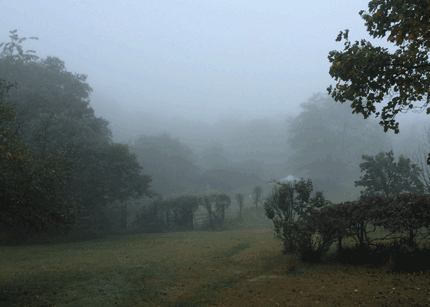
It rained early one morning, a brief respite in the dry spell; not a determined rain at first, it fell softly, a low patter in the canopy. Nevertheless it was a presence, a caress on my jacket and the stony path, gentle droplets condensed somewhere in the pale grayness far above misting on my face and hands. I was thinking about Jesus. In early December we will have a retreat that falls in Advent, and that season, for me, is rich with wonder and the poetry of Incarnation. The stories tell of a baby to be born, a Holy Child, embodied Love, a child fully human and Divine. It is amazing to me, how the unseen can become tangible in this world.
David Whyte’s poem “What To Remember When Waking” has these lines:
To be human
is to become visible,
while carrying
what is hidden
as a gift to others.
To remember
the other world
in this world
is to live in your
true inheritance.
I am no theologian, and I wonder sometimes what it feels like to be born into this world, wholly and suddenly human, carrying an intimate and immanent knowledge of God’s love, a gift to all humanity. Stories are powerful things, perhaps especially the ones we cherish and want to hear over and over, particularly during sacred seasons, no matter what religion we may call our own. With each telling, begun and ended, another star shard is left behind, a glimmer of enlightenment, perhaps, or a bit of insight: ours to use, as Clarissa Pinkola Estes says, “for the making and mending of life”. Matthew wrote down how later in his life Jesus went into the mountains, into Judea, teaching and healing and telling everything he knew of the other world that he remembered. Finally Peter asked him, “We have left everything and followed you…what then shall we have?” From the heart of a life lived in its true inheritance, Jesus replied, “…eternal life.”
Mary Oliver wrote in her poem “Messenger”:
My work is loving the world.
…Let me keep my mind on what matters,
which is my work…
Which is mostly rejoicing, since all the ingredients are here,
which is gratitude, to be given a mind and a heart
and these body-clothes,
a mouth with which to give shouts of joy
to the moth and the wren, to the sleepy dug up clam,
telling them all, over and over, how it is
that we live forever.
Here at Rolling Ridge we had a retreat for those of us in the residential community and on the board—a gathering to connect and also, in part, to name the areas of retreat programming for which we have a “charism”. These areas are broad and far more diverse than what has been offered in recent years. In our conversations, we wondered about the interesting and intricate dance many of us are doing through, with, and around our faith of origin in a complex and unraveling world. For sure, we want to offer retreats that create safe and inviting containers for people of all faith traditions, (or no conventionally understood faith at all for that matter), to listen, explore, find hope and encouragement, to deepen into their path, to find and “Hold to your own truth at the center of the image you were born with.” And we want to offer retreats that are unabashedly faith focused, in which those rooted in a particular tradition or religion can probe its meaning and message in our time. For any of us so inclined in the room on that day, that religion is Christianity.
The turbulent blessing of community is that we differ, often deeply, from one another. The one voice is made of a thousand melodies, all passionate, all called, all true. What makes the stormy and difficult song achingly beautiful and possible is the grace of vulnerability, courage, forgiveness, and love. We do not hum in monotone, and the price of that is grief and joy. It’s something we have to learn and experience again and again.
Next month we will host a retreat, “Embracing Blessed Unrest”, that seeks to be a vessel to weave conversation; to practice affirming, honoring, and learning from one another; to listen, contemplate, and connect around this miraculous song of faith and community.
Meanwhile, I walked through the rain in the forest musing on Jesus and poetry, and the invitations that hang all the time in the air to make connections, some of them awkward and astonishing. In late August, as Scot and Joy were standing and talking near the small garden pond that Linda and Scot have made at Woodhaven, they had a surprise sighting, of what Scot called a “trifecta”: a parasitic wasp attached to a cicada being eaten by a praying mantis.

The rain thickened, falling for a time with gusto, thrumming on the roots of the trees. One never knows what one will feel, see, and hear, and learn: from the myriad of experiences and questions we each have in community, from the wild and wonderful world all around, and from within. We find ourselves in an amazing situation, with eyes and skin, ears, bones, and hearts: incarnate. There is a lot going on.
Thomas Merton, the great Christian monk and mystic, put it this way in his “Rain and the Rhinoceros” essay from Raids on the Unspeakable:
The rain surrounded the cabin…with a whole world of meaning, of secrecy, of rumor. Think of it: all that speech pouring down, selling nothing, judging nobody, drenching the thick mulch of dead leaves, soaking the trees, filling the gullies and crannies of the wood with water ...Nobody started it, nobody is going to stop it. It will talk as long as it wants, the rain. As long as it talks I am going to listen.